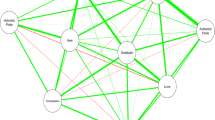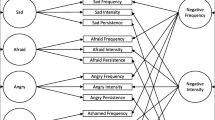Abstract
A case is made that it is both important and feasible to investigate the subjective experience of emotion within a loosely conceived framework of conventional science. Those studies in which this attempt has been made are reviewed according to the emphases which have guided them: methodological, the situational approach, and the individual approach, concentrating either on the person or the experience. Guidelines are suggested for future research in this area.
Similar content being viewed by others
References
Aderman, D. (1972). Elation, depression and helping behaviour. Journal of Personality and Social Psychology, 24, 91–101.
Allen, J.G. (1976). Correlates of emotional style. Journal of Consulting and Clinical Psychology, 4, 678.
Allen, J.G. & Haccoun, D.M. (1976). Sex differences in emotionality. A multidimensional approach. Human Relations, 29, 711–722.
Allen, J.G. & Hamsher, J.H. (1974). The development and validation of a test of emotional styles. Journal of Consulting and Clinical Psychology, 42, 663–668.
Barton, K. & Cattell, R.B. (1974). Changes in psychological state measures and time of day. Psychological Reports, 35, 219–222.
Bavelas, J.B. (1978). Personality: Current Theory and Research. California: Wadsworth.
Bloch, A.M.A. (1969). Remembrance of feelings past: A study of phenomenological genetics. Journal of Abnormal Psychology, 74, 340–347.
Bloch, J. (1954). Studies in the phenomenology of emotions. Journal of Abnormal and Social Psychology, 54, 358–363.
Bottenberg, E.H. (1975). Phenomenological and operational characteristics of factor-analytically derived dimensions of emotion. Psychological Reports, 37, 1253–1254.
Breuer, S.R. (1976). A study of the duration, intensity, semantics and phenomenology of adjectives used to describe the fear emotions. Dissertation Abstracts International, 36, 6351–6352.
Campbell, A. (1976). Subjective measures of well-being. American Psychologist, 31, 117–124.
Cialdini, R.B. & Kenrich, D.T. (1976). Altruism as hedonism: A social development perspective on the relationship of negative mood states & helping. Journal of Personality & Social Psychology, 34, 907–914.
Constantini, A.F., Braun, J.R. Davis, J. & Iervolino, A. (1973). Personality & mood correlates of schedule of receipt experience scores. Psychological Reports, 32, 1143–1150.
Constantinople, A. (1970). Some correlates of average level of happiness among college students. Developmental Psychology, 2, 447.
Davitz, J.L. (1969). The Language of Emotion. New York & London: Academic Press.
Davitz, J.L. (1970). A dictionary and grammar of emotion. In M.L. Arnold (ed.) Feelings & Emotions: The Loyola Symposium. New York & London: Academic Press.
Delin, P.S. & Winefield, A.H. (1973). On having the teeth set on edge: preliminary enquiry. Psychological Reports, 33, 379–382.
Dershowitz, N.K. (1975). On connotative meaning of emotional terms to the blind. Perceptual & Motor Skills, 41, 87–94.
Devine, B. Lundberg, U. (1977). The influence of emotional conditions on similarity estimations of emotional terms. Scandinavian Journal of Psychology, 18, 317–326.
Efran, M.G. & Cheyne, J.A. (1974). Affective concomitants of the invasion of shared space: behavioural, physiological & verbal indicators. Journal of Personality & Social Psychology, 29, 219–226.
Fishbein, M. (1965). A consideration of beliefs, attitudes & their relationships. In I.D. Steiner & M. Fishbein (eds.) Current Studies in Social Psychology. New York: Holt, Rinehart & Winston.
Fogel, M.L. Curtis, G.C., Kordasz, F. & Smith, W.G. (1966) Judges’ rating, self-ratings & checklist report of affects. Psychological Reports, 299–307.
Flugel, J.C. (1955). A quantitative study of feeling and emotion in everyday life. In Studies in Feeling & Desire. London: Duckworth.
Frijda, N. (1969). Recognition of emotion. In L. Berkowitz (ed.) Advances in Experimental Social Psychology, 4, 167–223.
Gilden, A. (1969). Children’s label of descriptions of emotional experiences. Dissertation Abstracts International, 30, 845–846.
Giorgi, A. (1970). Psychology as a Human Science: A Phenomenologically Based Approach. New York: Harper & Row.
Gorman, B.S. & Wessman, A.E. (1974). The relationship of cognitive styles and moods. Journal of Clinical Psychology, 30, 18–25.
Greene, P.A. (1977). Affective learning & mood induction. Dissertation Abstracts International, 38, 1402.
Griffith, M. (1977). Effects of noncontingent success & failure on mood and performance. Journal of Personality, 45, 442–457.
Harris, M.B. (1977). Effects of altruism on mood. Journal of Social Psychology, 102, 197–208.
Harris, M.B. & Smith, R.J. (1975). Mood and helping. Journal of Psychology, 91, 215–221.
Herron, E.W. (1969). The multiple affect adjective check list: A critical analysis. Journal of Clinical Psychology, 25, 46–53.
Hillman, J. (1960). Emotion. London: Routledge & Kegan Paul.
Hoffman, H. & Peterson, D. (1970). Analysis of moods in personality disorders. Psychological Reports, 27, 187–190.
Irwin, R., Kammann, D. & Dixon, G. (1979). If you want to know how happy I am you’ll have to ask me. New Zealand Psychologist, 8, 10–12.
Isen, A.M. (1970). Success, failure, attention and reaction to others: The warm glow of success. Journal of Personality & Social Psychology, 15, 294–301.
Isen, A.M. & Levin, P.F. (1972). Effect of feeling good on helping. Journal of Personality & Social Psychology, 21, 384–388.
Izard, C.E. (1972). The Face of Emotion, New York: Appleton-Century-Crofts.
Izard, C.E. (1977). Human Emotions. New York: Plenum Press.
Izard, C.E. & Caplan, S. (1974). Sex differences in emotional responses to erotic literature. Journal of Consulting & Clinical Psychology, 42, 468.
Johnston, M. & Huckman, A. (1977). Cross validation & response sets in repeated use of mood questionnaires. British Journal of Social & Clinical Psychology, 16, 235–239.
Kammann, R., Christie, D., Irwin, R. & Dixon, G. (1979). Properties of inventory to measure happiness (and psychological health). New Zealand Psychologist, 8, 1–9.
Kelsall, P.N. & Strongman, K.T. (1978). Emotional experience & the implication grid. British Journal of Medical Psychology, 51, 243–251,
Kerle, R.H. & Bialek, H.M. (1958). The construction,validation & application of a subjective stress scale. Staff Memorandum, U.S. Army Leadership Human Research Unit, Pusidio of Monterey, Feb. 1958.
Kilty, K.M. (1969). On the relationship between affect & cognition. Psychological Reports, 25, 215–219.
Krebs, J.S. (1974). The infinite spaceship. A phenomenological analysis of the experience of loneliness. Dissertation Abstracts International, 35, 1052.
Laird, J.D. (1974). Self-attribution of emotion: The effects of expressive behaviour on the quality of emotional experience. Journal of Personality & Social Psychology, 29, 475–486.
Laird, J. & Crosby, M. (1974). Individual differences in self-attribution of emotions. In H. London & R. Nesbitt (eds) Thought & Feeling: Cognitive Alteration of Feeling States. Chicago: Aldine.
Lamont, J. (1973). Depressed mood & power over the feelings of other persons. Journal of Clinical Psychology, 29, 319–321.
Lewis, J.F. (1975). Ecstatic experience: A classification. Dissertation Abstracts International, 35, 5645.
London, H. & Monello, L. (1974). Cognitive manipulation of boredom. In H. London & R. Nesbitt (eds.) Thoughts & feelings: Cognitive alteration of feeling states. Chicago: Aldine.
Mandler, G. (1976). Mind & Emotion. New York & London: Wiley.
Marsella, A.J., Murray, M.D. & Golden, C. (1974). Ethnic variations in the phenomenology of emotions. Journal of Cross-Cultural Psychology, 5, 312–328.
Matheny, K.B. & Blue, F.R. (1977). The effects of self-induced mood states on behaviour & physiological arousal. Journal of Clinical Psychology, 33, 936–940.
McLachlan, J.F. (1977). A scale for the evaluation of psychological distress. Journal of Clinical Psychology, 33, 159–161.
McMillan, D.W. (1977). A study of the experience of emotion as a function of factors related to naturally occuring behaviour settings. Dissertation Abstracts International, 38, 2376.
Meadows, G.M. (1975). The phenomenology of joy, an empirical investigation. Psychological Reports, 37, 39–54.
Mehrabian, A. & Russell, J.A. (1974a). An Approach to Environmental Psychology, Cambridge, Mass: M.I.T. Press.
Mehrabian, A. & Russell, J.A. (1974b). The basic emotional impact of environments. Perceptual & Motor Skills, 38, 283–301.
Miller, S.A. (1977). Dependency, empathy & altruism: A preliminary study of proposed relationships. Dissertation Abstracts International, 37, 5331.
Moore, R.S., Underwood, W. & Rosenhan, D.L. (1973). Affect & altruism. Developmental Psychology, 8, 99–104.
Murphy, P.P. (1977). The mid-life crisis in retrospect: An analysis of some recollections of specific emotional concerns experienced during middle-age. Dissertation Abstracts International, 37, 5331–5332.
Neufeld, R.W.J. (1973). Semantic dimensionality of the subjective stress scale. Psychological Reports, 33, 885–886.
Noll, G.A. (1969). The reported experience of emotion. Dissertation Abstracts International, 30, 1384.
Nourse, J.C. & Welch, R.B. (1971). Emotional attributes of colour: A comparison of violet & green. Perceptual & Motor Skills, 32, 403–406.
Nowlis, V. (1953). The development of modification of motivational systems in personality. In M.R. Jones (ed.) Current Theory & Research in Motivation. Lincoln, Nebraska: University of Nebraska.
Nowlis, V. (1959). The experimental analysis of mood. XVth International Congress of Psychology. Acta Psychologica, 15, 426.
Nowlis, V. (1963). The concept of mood. In S.M. Farber & R.H.L. Wilson (eds.) Conflict & Creativity, New York: McGraw-Hill.
Nowlis, V. (1965). Research with the mood adjective check list. In S.S. Tomkins & C.E. Izards (eds.). Affect, Cognition & Personality, New York: Springer.
Nowlis, V. (1970). Mood, behaviour & experience. In M.B. Arnold (ed.) Feelings & Emotions: The Loyola Symposium. New York: Academic Press.
Nowlis, V. & Nowlis H.H. (1956). The description & analysis of moods. Annals of the New York Academy of Science, 65, 345–355.
Oudry, Y.M. (1974). Reported emotional experiences in relation to ethnic & sex group membership. Dissertation Abstracts International, 34, 5203.
Panzarella, R. (1977). The phenomenology of peak experiences in response to music & visual art & some personality correlates. Dissertation Abstracts International, 38, 419–420.
Pecjak, V. (1970). Verbal synaesthesia of colours, emotions & days of the week. Journal of Verbal Learning & Verbal Behaviour, 9, 623–626.
Russell, J.A. & Mehrabian, A. (1974). Distinguishing anger & anxiety in terms of emotional response factors. Journal of Consulting & Clincial Psychology, 42, 79- 83.
Russell, J.A. & Mehrabian, A. (1977). Evidence for a three-factor theory of emotions. Journal of Research in Personality, 11, 273–294.
Ryman, D.H., Biersner, R.J. & LaRocco, J.M. (1974). Reliabilities & validities of the mood questionnaire. Psychological Reports, 35, 479–484.
Sartre, J.P. (1948). The Emotions. New York: Philosophical Library.
Schiffenbauer, A. (1974). Effect of observer’s emotional state on judgements of the emotional style of others. Journal of Personality & Social Psychology, 30, 31–35.
Shatin, L. (1970). Alteration of mood via music: A study of the vectoring effect. Journal of Psychology, 75, 81–86.
Spignesi, A. (1977). A phenomenological & experimental approach to the study of emotion judgements. Dissertation Abstracts International, 38, 2351.
Stanley, G. (1971). Emotional involvement & subjective distance. Journal of Social Psychology, 84, 309–310.
Tart, G.T. (1972). States of consciousness and state-specific sciences. Science, 176, 1203–1210.
Titelman, P. (1977). A phenomenological study of envy. Dissertation Abstracts International, 38, 383.
Underwood, W.C. (1974). The effect of mood state on self-evaluation & self-reward. Dissertation Abstracts International, 34, 4722.
Velten, E. Jnr. (1968). A laboratory task for induction of mood states. Behaviour Research & Therapy, 6, 473–482.
Werdman, A.M. (1976). Words and feelings: Children’s vocabulary of selected emotions. Dissertation Abstracts International, 37, 2827
Wittmaier, B.C. (1974). Changes in arousal as a function of emotional or nonemotional appraisal. Psychonomic Society Bulletin, 3, 56–58.
Woods, D.J., Cole, S. & Ferrandez, G. (1977). Dream reports & the test of emotional styles: A convergent-discriminant validity study. Journal of Clinical Psychology, 33, 1021–1022.
Zuckerman, M. (1960). The development of an affect adjective check list for the measurement of anxiety. Journal of Consulting Psychology, 24, 457–462.
Zuckerman, M. (1977). Development of a situation-specific trait-state test for the prediction & measurement of affective responses. Journal of Consulting & Clinical Psychology, 45, 513–523.
Zuckerman, M. & Lubin, B. (1965). Normative data for the multiple affect adjective check list. Psychological Reports, 16, 438.
Zuckerman, M., Lubin, B., Vogel, L. & Valerius, E. (1964). Measurement of experimental induced affects. Journal of Consulting Psychology, 28, 418–425.
Author information
Authors and Affiliations
Rights and permissions
About this article
Cite this article
Strongman, K.T. Emotional experience — a review. Current Psychological Reviews 1, 17–33 (1981). https://doi.org/10.1007/BF02979252
Accepted:
Issue Date:
DOI: https://doi.org/10.1007/BF02979252




